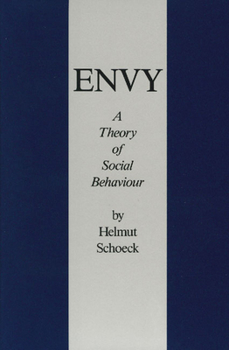Envy: A Theory of Social Behaviour
Select Format
Select Condition 
Book Overview
"Envy" was first published in German in 1966, then in an English translation in 1970. This classic study is one of the few books to explore extensively the many facets of envy--"a drive which lies at... This description may be from another edition of this product.
Format:Paperback
Language:English
ISBN:0865970645
ISBN13:9780865970649
Release Date:December 1987
Publisher:Liberty Fund
Length:464 Pages
Weight:1.55 lbs.
Dimensions:1.2" x 5.9" x 8.9"
Age Range:18 to 10 years
Grade Range:Postsecondary to Grade 5
Customer Reviews
1 rating
A fascinating study of human behavior and motivation
Published by Thriftbooks.com User , 19 years ago
I loved this book, a true tour-de-force. Although I am a fairly fast reader, it took me a while to get through this, because after reading 10-15 pages, I would have to stop and assimilate the information Schoeck was presenting. Absolutely fascinating. Schoeck has assembled a vast array of information on the manifestations of envy in societies spanning the globe and across time. He has ferreted out information from the sociological and anthropological literature, fiction literature, cultural fables, crime data, political debates, among other sources. He uses example after real world example to show how ubiquitous envy is as a state of mind, and how various cultures deal more or less successfully with it. Societies that are successful in dealing with envy are essentially those that largely suppress its active, overt expression. Numerous cases from the sociological and anthropological literature indicate how primitive societies, where objective differences between society members are much smaller than in more developed cultures, actually have more severe problems with the expression of envy than do cultures where such differences are larger. He shows how world-wide in primitive cultures, the 'evil eye' is universally regarded as the sorcerous expression of envious malice, and further shows the lengths to which primitive peoples will go to avoid or deflect the evil eye. Schoeck reveals from objective sources that such envy appeasement is not limited to primitive societies, but that egalitarian redistributionist policies are merely the manifestation of envy avoidance and/or appeasement in industrialized nations. Schoeck spends extensive energies analyzing the egalitarian-utopian impulse and its various practical experiments. Those of a socialist/egalitarian bent [generally known as 'liberals' in the US, and contemporary as opposed to the classical type] will not like this book, because Schoeck makes an iron-clad case that their reasons for promoting such an unattainable society are either 1) envious malice seeking to deprive others of envied assets or 2) the appeasement of envy in others. Schoeck shows, from the writings of people who have promoted utopian social models, that the motive for doing so is to create an envy-free society. He marshals an impressive body of documentation showing that policies such as progressive taxation are essentially institutionalized envy. The so-what of all this is where Schoeck shows that uncontrolled envy inhibits all innovation and technical progress, and the destruction of achievements made in a society. He cites evidence showing further, how the legitimization of envy, and its subsequent appeasement, results in a vicious cycle in which the crocodile must be continually fed, as each social difference successively assumes the position of the BIGGEST difference, and becomes the new target for elimination by those who are envious of differences.




